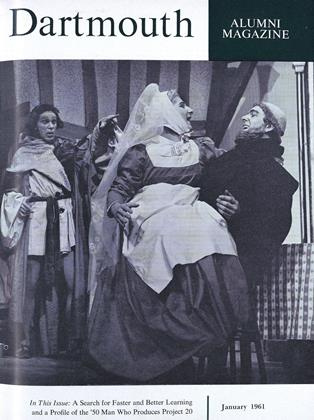By Robert 0.Blood Jr. '42 and Donald M. Wolfe. Illinois, Free Press, 1960. 293 pp. $5.00.
The senior author of this important monograph is a leading authority in one of the newest and most dynamic fields in the behavioral sciences - namely, the study of the relationships leading up to and involving marriage in the United States. At the present time, more than a thousand institutions of (more or less) higher learning offer courses in this area, and hundreds of thousands of young men and women happily flock into these classrooms in quest of information on this fascinating series of re- lationships. The present book is a significant contribution to the theory and, especially, to the existing empirical knowledge of this sector of American life.
This is a report on a five-year study of 909 families in the Detroit area, 731 of them living in the city and 178 on farms in the counties adjacent to the metropolitan area. The data were gathered by interview and questionnaire, with the wife supplying the information on a wide variety of marital relationships. The findings are summarized in 133 tables, and the text is built around these basic compilations.
The authors have grouped their conclusions about the following major topics: Family Structure (sources, of authority and division of labor); Family Functions (economic provision, having children, providing companionship, fostering emotional wellbeing, and offering mutual affection); and a final section on the Stresses and Strengths of American marriage.
The reader of this family journal does not need to be told that these are important subjects. They are, indeed, subjects on which everybody is an admitted authority and which have traditionally generated more heat than light.
The outstanding merit of the present book is that it asks a number of questions on matters which virtually everyone ("experts" and laymen alike) have always taken for granted. For example, it has long been assumed, largely on a priori evidence, that some groups are more husband-dominated (patriarchal) than others. On the basis of a number of perfectly plausible reasons, these allegedly patriarchal groups include: those living on farms, recently arrived from a peasant Europe, older couples, those with little education, and Catholic couples. In one way or another, each of these groups presumably fosters the authority of the husband at the expense of that of the wife.
The only trouble with this soothing hypothesis is that, according to the present authors, it is not true. Authority in the contemporary American family, they maintain, is more subtle in its origins than any of the above unilateral explanations would indicate. The power to make family decisions, rather, reflects "the resources which the individual can provide to meet the needs of his marriage partner and to upgrade his decision-making skill." In other words, the personal qualities, interpersonal relations, and socioeconomic milieu of the couple in question determine whether the husband or the wife will make more than the average number of family decisions.
The overall picture which the authors draw of the state of the (marital) nation is one of guarded optimism. Marriage, they aver, continues to be a reasonably effective method of meeting the complex needs of adult human beings in the nuclear age. Most wives (and presumably most husbands) were found to be fairly well satisfied with their scale of living and the sympathetic understanding which they received from their spouses. There are, it is true, weak spots - notably among lower-income and minority-group families. Striking disparities in education, religion, and age likewise contribute to the malaise of marriage. On balance, however, the 909 Detroit-area wives present little evidence, either explicit or implicit, that marriage and the family in America are in imminent danger of collapse. Both, it seems, are here to stay.
 View Full Issue
View Full Issue
More From This Issue
-
 Feature
FeatureTHE WORLD OF DONALD HYATT
January 1961 By CLIFFORD L. JORDAN JR. '45 -
 Feature
FeatureA Search for a Faster and Better Way to Learn
January 1961 -
 Feature
FeatureArt Collection Enriched
January 1961 -
 Article
ArticleDeaths
January 1961 -
 Article
ArticleThe Return of the Log-Peeler
January 1961 By GEORGE R. ANDREWS '37 -
 Article
ArticleThe D.O.C. and Its Cabin Chain
January 1961 By WILLIAM S. RILEY '63
FRANCIS E. MERRILL '26
-
 Sports
SportsTENNIS
August 1946 By Francis E. Merrill '26 -
 Sports
SportsBASEBALL
May 1947 By Francis E. Merrill '26 -
 Sports
SportsCREW
May 1948 By Francis E. Merrill '26 -
 Sports
SportsHOCKEY
February 1949 By Francis E. Merrill '26 -
 Sports
SportsTrack
June 1951 By Francis E. Merrill '26 -
 Sports
SportsGolf
July 1951 By Francis E. Merrill '26
Books
-
 Books
BooksFaculty Notes
October 1948 -
 Books
BooksTHE FAMILY AND ITS SOCIAL FUNCTIONS
July 1940 By Andrew G. Truxal -
 Books
BooksOLD GLAMORS OF OLD AUSTRIA
DECEMBER 1930 By Arnold K. Borden -
 Books
BooksAT THE CROSSROADS.
OCTOBER 1965 By CLIF JORDAN '45 -
 Books
BooksTHE DEVELOPMENT OF THE TREASURY 1660-1702.
November 1957 By JOHN R. WILLIAMS -
 Books
BooksSELECTED POEMS.
MAY 1966 By RICHARD EBERHART '26


